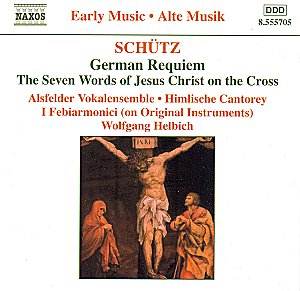The 'Musicalische Exequien'
belong to the most famous and most solemn
of Schütz's oeuvre. The work was
commissioned by Heinrich Posthumus 'the
younger' of Reuss-Gera, an educated
and cultivated ruler. When he was over
sixty he started to make preparations
for his death. These preparations included
an exact plan specifying what was to
happen at the funeral ceremony and in
which sequence - including the music
to be performed, for which he commissioned
Heinrich Schütz.
Schütz's music
is not a sort of German protestant version
of the Roman Catholic Requiem. In this
respect the title of the disc, "German
Requiem", is misleading. It was part
of a funeral procedure which was rooted
in pre-Reformation tradition of "exequies"
(Lat. exequiae = accompanying a dead
person out). They contain three parts:
the transfer of the body to the church,
the celebration of the Requiem Mass
and the procession to the grave.
Being part of a funeral
procedure this work could perhaps best
be compared with Purcell's Funeral Sentences
for Queen Mary.
The three parts are
composed in different ways. Part 1 consists
of 21 quotations from the Bible and
from hymns are set in the form of a
German Mass - it says: "Concert in Form
einer teutschen Begräbnis-Missa".
The first section - "Nacket bin ich
von Mutterleibe kommen" - serves as
Kyrie, the second - "Also hat Gott die
Welt geliebt" - as Gloria. Here we find
a strong connection to the Lutheran
'Missa brevis' (consisting of Kyrie
and Gloria only). The quotations from
the Bible are set as small sacred concertos
(like the 'Kleine Geistliche Konzerte',
whose publication Schütz was preparing
during the time of his composition of
the Musicalische Exequien), the hymns
as 6-part motets, to be sung by the
'cappella'. (Schütz doesn't use
the chorale melodies as they are still
known today.) Part 2 is a bichoral sermon
motet, part 3 is a chorus for 5 voices.
This section is remarkable in that the
first choir (5 voices) should sing the
'Canticum Simeonis' at the organ, whereas
the second 'choir', only consisting
of three voices (2 sopranos and bass)
should sing the text "Selig sind die
Toten" in the crypt, in which Heinrich
Posthumus was going to be buried.
In recordings of this
work one has to look for other music
to fill the remaining space on the disc.
Most recordings contain other motets
and sacred concertos regarding death.
In this case the main other item is
Schütz's setting of the seven words
of Jesus at the cross. This is perhaps
not the most satisfying choice, as this
work is not about death in the way the
Musicalische Exequien are. One could
argue, though, that the most crucial
text part of the Musicalische Exequien
is that which directly refers to the
death and resurrection of Christ as
the very foundation of Christian faith:
"Christus ist mein Leben" and "Siehe,
das ist Gottes Lamm" (For me to live
is Christ and to die is gain. Behold
the lamb of God who beareth the sins
of the world).
It is not known when
and for which occasion the Seven Words
were composed. This piece contains some
interesting aspects. The music is relatively
simple, and therefore this work was
perhaps composed for small chapels lacking
professional singers. The work opens
and closes with stanzas from the passion
hymn 'Da Jesus an dem Kreuze stund'
(Schütz doesn't use the chorale
melody, though), which is also about
Jesus's words at the cross. Schütz
presents these words in prose, and changes
the order of the words as they are referred
to in the hymn and brings them in line
with the actual order as reported in
the gospels. The words of Jesus at the
cross are supported by two violins,
a practice which was also used by Schütz's
pupil Johann Theile and later Johann
Sebastian Bach in their respective settings
of the Passion according to St Matthew.
The words of the Evangelist are given
to a solo voice (soprano, alto or tenor),
or an ensemble of four voices. This
reminds of the practice in Schützís
Auferstehungshistorie. The piece isn't
dramatic, but has a rather meditative
character, as the closing stanza indicates:
"Who holds in reverence God's torment
and thinks often of the seven words,
God will keep him".
The last two pieces
are from the 'Geistliche Chormusik',
a collection of motets which was published
in 1648. In this Schütz underlines
the importance of the traditional polyphony,
which he also used in the motet-style
parts of the Musicalische Exequien.
The recording is generally
enjoyable. I very much admire the performances
of the soloists. Their diction and articulation
are immaculate, and their declamatory
style of singing does full justice to
the rhetorical character of these compositions
by Schütz, who was always keen
to put the text in the centre. The voices
are all very clear and blend well.
The choir as such is
good, but nevertheless it is the disappointing
part of this recording, especially since
its sound is rather dense and isnít
as transparent as it should be. The
choir is a little too large, and there
is too much of a gap between solo voices
and choir. The ideal for Schütz's
music is a vocal ensemble whose members
also sing the solo parts. In that respect
Philippe Herreweghe's recording of the
Musicalische Exequien (Harmonia mundi)
is superior to this one.
The same problem occurs
in the Seven Words. The two motets are
far more satisfying.
On the whole, though,
this is a fine recording which can be
recommended. And the music never ceases
to impress.
Johan van Veen
see also review
by Michael Cookson


